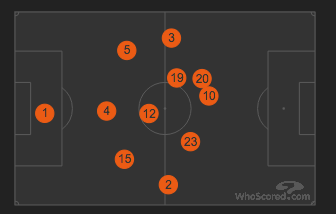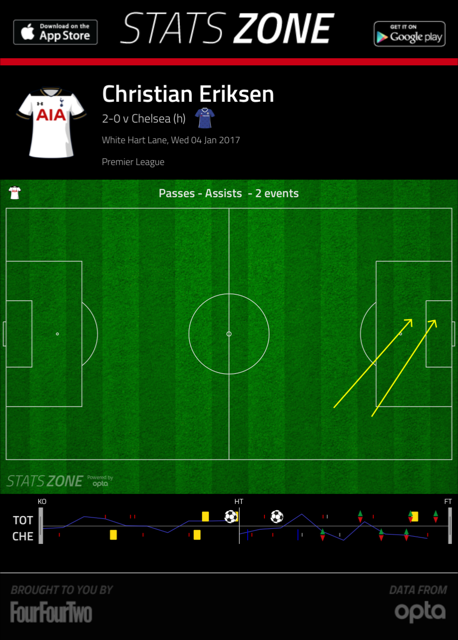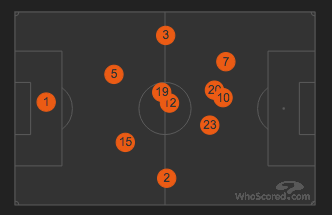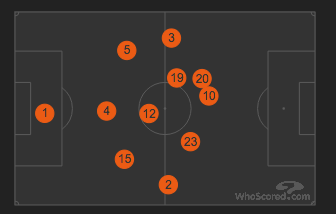Loanee Round-Up
Spurs have used the loan system to send out a few players this year – primarily those that they are looking to sell, but also a couple of younger prospects. I shall start with four players who have now either left Spurs or look set to in the summer.
Federico Fazio – AS Roma (Serie A)
Fazio played 3766 minutes at Roma, including 2937 in Serie A. The transfer was reportedly made permanent in January, but that has not been confirmed by either club as yet. He has been a mainstay there and has become a popular figure.
Nabil Bentaleb – FC Schalke 04 (Bundesliga)
Bentaleb has played 3354 minutes for Schalke including 2463 in the Bundesliga during which he has five goals and five assists. It’s easy to see why Schalke have made the transfer permanent – good luck, Nabil, I for one shall miss you.
Clinton Njie – Marseille (Ligue 1)
Njie has played 1118 minutes for Marseille scoring four goals and getting an assist in Ligue 1. He has played mostly from the left wing, but occasionally as a centre-forward. He seems likely to make the move permanent in the summer, though it seems the deal is dependent on various clauses being met.
Nathan Oduwa – Peterborough United (League One)
Oduwa only managed 112 minutes across three competitions for Peterborough before joining Slovenian PrvaLiga club Olimpija Ljubljana on a permanent basis in January.
Many thanks to Alan Swan (@PTAlanSwann), Chief Sports Writer at the Peterborough Telegraph, who provided the following on his progress:
Nathan Oduwa was a strange signing as our team played a rigid midfield diamond formation for most of his time with us. They had no real use for wingers.
Oduwa didn’t start a single game, not even in the Checkatrade Trophy when the inexperienced and very young often played.
He showed very little in his nine substitute appearances, but most of them were very brief.
A disappointing season for Oduwa, after creating a bit of buzz last year. We wish him well in Slovenia.
Will Miller – Burton Albion (Championship)
Miller made 15 Championship appearances for Burton, accumulating 402 minutes in the league and another 32 in the FA Cup.
Many thanks to Joshua Murray (@JoshuaMurrayBM) — who is the Burton Albion writer from the Burton Mail — for this terrific write-up on Miller.
The Spurs website labels Will Miller a ‘versatile attacking midfielder’, but it was up front where the 20-year-old gained almost all of his game time on loan at Burton Albion.
His pace around the field up top made him a constant nuisance to defenders as he chased and harried them down out of possession, while allowing him to make dangerous runs into the channels when Albion attacked.
Miller also showed a good eye for finding space as a striker. That showed when he grabbed his first goal in senior football, notching a 94th-minute equaliser at Wolves in September. He hung back on the edge of the box as a cross from the right was looped towards the far post, before charging into a gap just as possession was knocked back into the danger area – and he was on hand to provide the cool finishing touch.
Brewers boss Nigel Clough has spoken highly of Miller’s presence in the Albion camp all season. He could have returned to Spurs in January when his initial loan deal expired, but decided to stay on and help the club’s bid for Championship survival, despite battling with six other loanees, with a limit of five loan spaces in a matchday squad.
His attitude around the training ground was apparently superb, and he will have learned plenty from playing alongside experienced forwards like Chris O’Grady and Luke Varney this term, having made a total of 16 first-team appearances.
If his work ethic on and off the field for the Brewers is anything to go by, he could well have a bright future ahead at White Hart Lane.
Miller has been included in the first-team squad for the friendly in Hong Kong later this week.
Luke McGee – Peterborough United (League One)
McGee ended the campaign with Peterborough’s Players’ Player of the Season award, having kept nine clean sheets in 39 matches in League One.
Many thanks again to Alan Swan (@PTAlanSwann), who provided the following about Luke:
Luke McGee is the best goalkeeper I’ve seen at Posh in the last 20 years.
Excellent shot-stopper (including four penalty saves), good control of his penalty area, decent with the ball at his feet and obvious passion for his team. Luke was never afraid to speak/shout his mind at defenders and officials.
Form did dip a little in the second-half of the campaign, but he finished the season strongly.
We’d love to have him back (Barry Fry has offered to take him on a free transfer with a huge sell-on clause which is good of him), but he is obviously destined for far better things than our little club.
Luke Amos – Southend United (League One)
Amos only played 125 minutes for Southend, but was well thought of by Phil Brown. Their promotion chase made it difficult for Brown to mess with a settled team.
After his football league debut, in which he played 51 minutes as they came back from 2-0 down to beat Walsall 3-2, Brown said “I was so disappointed for Luke Amos that I had to bring him off. He played well and kept the ball. He has a good career ahead of him.”
20-year old Amos is a busy, technically-sound central midfielder and another League One loan next year would be handy; particularly if he could head out at the beginning of the year an establish himself for a full season.
Connor Ogilvie – Stevenage (League Two)
Ogilvie re-joined Stevenage in January and made 18 appearances, playing 1619 minutes in League Two. Ogilvie was very popular amongst Stevenage fans as the responses to this tweet will testify.
Gutted we didn't make the play-offs, but want to thank the boys, fans and Darren Sarll for making me feel part of the club. #UpTheBoro ??? pic.twitter.com/ij2pbqy9cB
— Connor Ogilvie (@Connor_Ogilvie) May 8, 2017
After such a promising start to his career with glittering displays in Under-18 football, Ogilvie has stagnated somewhat. I think he has suffered a little from being equally comfortable at left-back and centre-back (though he played as an attacking left-back for Stevenage). As Spurs will likely need left-sided centre-back cover next season (assuming Wimmer leaves), it will be interesting to see whether Ogilvie, now 21, is taken on the pre-season tour, or whether he is sold in the summer; one would presume the latter.
Ryan Loft – Stevenage (League Two)
Loft played just 82 minutes across nine appearances, coming on at the end of matches.
With thanks to Neil Metcalfe (@Metcalficus) for his thoughts on Ryan Loft:
Loft never really worked. Looked a little overawed with the senior game. Had one glorious chance at Hartlepool not long after coming up but it came at him quick and was missed. Would have been a big confidence boost had it gone in. But given a longer loan spell somewhere next season it may be different.
He returned to play several Premier League 2 matches as he was not getting much game-time, and it will be interesting to see whether he is kept on to make up the numbers in the PL2 next season.
Shayon Harrison – Yeovil Town (League Two)
Harrison played 530 minutes for Yeovil across 16 appearances, scoring once.
Harrison was name-checked by Pochettino during the season which caused a bit of hype, but the 19-year old looks some way off a first team shot as it stands.
More of a natural number ten than an out and out nine, Harrison has consistently scored goals at youth level and now needs to ensure that the rest of his game can match his finishing.
Anton Walkes – Atlanta United (MLS)
Many thanks to Doug Roberson (@DougRobersonAJC), a reporter for AJC, who provided the following on Walkes’ progress:
He has made two appearances for Atlanta United and is typically the third centerback in the rotation. He was unlucky to give up an own goal in the inaugural game against New York Red Bulls. He came in and played the second half of the loss at Montreal after Leandro Gonzalez Pirez received a red card at the end of the first half. He has shown athleticism and an understanding of manager Gerardo Martino’s system. The team’s schedule will become very compressed in September, which is when he may get a start or two. It will be interesting to see if Atlanta United tries to make the loan permanent in the winter transfer window.
Filip Lesniak – Slovan Liberec (Czech First League)
And finally our recent debutant, Lesniak. It did not work out for him at Slovan Liberec where he played just 48 minutes and returned early.
Despite making his Premier League debut against Leicester, Lesniak looks likely to leave in the summer when his contract ends. I could see him eventually doing well somewhere like Bournemouth where he’s a technically-sound, steady cog in a machine, but in all likelihood he will need to start lower and work his way back up the league structure.



